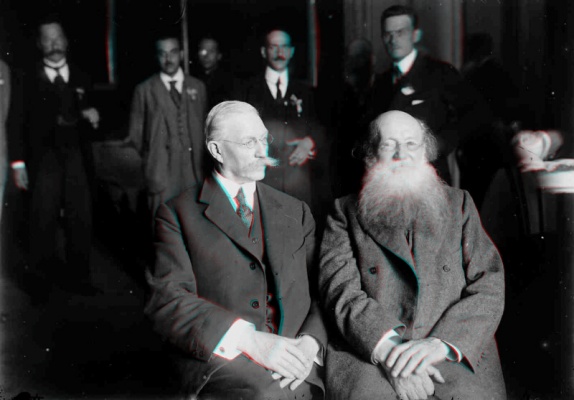

Also attending: Kerensky, Catherine Breshkovsky, KornilovCommander in Chief of the Petrograd command - from 18 March 1917, Nekrasov, Lvov, Rodzianko, Tsereteli, Guchkov, Plekhanov, Trubetskoy and others
A whole world of ideas and belief systems separates us, the non-socialists, from people “on the other coast.” It is not so much private and class-based interests that divide us, but a different understanding of the structure of human society and of the tasks of government.
I left power because there simply wasn’t any; the disease lies in the strange separation between power and responsibility. There are some who have complete power, but without a shadow of responsibility, while those who are in visible positions of power carry full responsibility, but without a shadow of actual power… See more
It was a nice warm day. During the morning I took a nice long walk. At 12 o'clock I gave Alexis a geography lesson. During the day we worked again in our vegetable garden. Even though the sun was scorching, we continued working successfully, I read until dinner time to myself and in the evening I read aloud. Yesterday we learned of the resignation of General Kornilov as Commander-in-Chief of the Petrograd Military District and this evening about the dismissal of Guchkov, See more
Milyukov and Shingaryev went to the front. While they were gone, a Provisional Government meeting was unexpectedly called late one evening in Prince Lvov's apartment. Kerensky and Tereshchenko took it upon themselves to sharply attack the point about the Straits and Milyukov’s entire role in the Provisional Government. I was the only one to stand up for him. See more
Guchkov’s resignation is a sensational one. Sensational not in itself, but in the manner in which it occurred: without issuing any warning to the government, without engaging in any preliminary discussions of the matter with his ministry colleagues, the minister of war quit his post even as the war raged on, declaring that the government lacked the capacity to fulfill its functions and that he, See more
The membership of the Provisional Government is still a conundrum. Born of a popular revolution, it is now made up of people who are as far away from the spirit of revolution and as close to the spirit of a coup d’etat as it as it is possible to imagine. The Minister of War in the Provisional Government, Guchkov, is the former alter ago of Stolypin the “hangman”. The Foreign Minister, Milyukov, is an imperialist who supports continuing the war “to a victorious end”. It is impossible to place one’s trust in any of the generals. See more
We arrived into Pskov. On the train station I was greeted by some colonel who asked me to proceed into the sovereign’s train car. I wanted to first meet general Ruzskiy to get a sense of the sentiment in Pskov. Me and Shulgin proceeded to the Czar’s train car.
The Emperor's last official act was to appoint the Grand Duke Nicholas Nicholaievich commander-in-chief and Prince Lvoff (the popular leader of the Zemstvos) as the new President of the Council. For, as the result of a compromise between the Duma committee and the Soviet, a Provisional Government had been formed to carry on the administration of the country till a con- stituent assembly had decided whether Russia was to be a Repubic or a Monarchy.
The principal members of this Government belonged to the Cadet and Octobrist parties. Miliukoff, the leader of the former, was appointed Minister for Foreign Affairs, and Guchkoff , the leader of the latter. Minister of War. Kerensky, who was made Minister of Justice, served as a link between the Soviet and the Government, and it had been mainly thanks to him that the opposition of the former had been overcome. During the heated discussion that had taken place on the question of the regency he had, in announcing his appointment as Minister of Justice, said in the Soviet: "No one is a more ardent Republican than I; but we must bide our time. Nothing can come to its full height at once. We shall have our Republic, but we must win the war; then we can do what we will."
I am not going to play games with you. If you suspect us of being engaged in politics, I will not dispute it for a minute. Yes, we are involved in politics, but it is the government that has turned us into a political organisation. We think the question of defence can only be resolved if the political conditions of our work are altered.